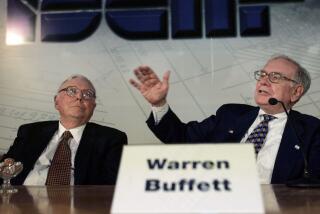There’s More to a Mutual Fund Than a Good Manager
- Share via
BOSTON — In recent years, mutual fund managers have taken on celebrity status among investors. But a recent study questions whether fund managers actually matter.
The most obvious example of a celebrity fund manager is Peter Lynch, who managed Fidelity’s giant Magellan Fund for 13 years before his retirement in 1990.
Even now, Lynch remains a familiar fixture in the financial press. Other managers, such as Michael Price of Mutual Shares, Carlene Murphy and Dick Weiss of Strong Common Stock, Jim Craig of Janus Fund, John Neff of Vanguard Windsor and more recently Jim Crabbe of the Crabbe-Huson Special Fund are well-known to investors who follow their exploits in the financial press.
In some cases, their funds have drawn so much attention and money that the managers have been forced to close their doors to new investors. Others have kept their doors open, however, and investors are pouring money into them as quickly as they can come up with the cash.
The reason for the funds’ popularity is simple: Over the years, their managers have gotten results. Their funds have consistently ranked high in the performance tables investors read in the press. So it stands to reason that investors want these pros managing their money.
But what happens when a hotshot manager leaves his or her fund?
Many shareholders immediately dump their fund holdings and move on in search of another celebrity manager--or follow the old manager to a new fund.
In some cases, that proves a wise decision: For example, when Murphy and Weiss left SteinRoe Special in 1991 to take over Strong Common Stock, they took their magic touch with them. Their new fund has posted a 117% gain since the March, 1991, manager change, versus a 39% gain for the S&P; 500. Meanwhile, SteinRoe Special has posted a 58% gain.
But what about shareholders who deserted the Magellan Fund when it lost Peter Lynch? Too bad for them. The fund has since gained 78%, versus a 45% return for the S&P; 500.
How do you know when a manager’s departure will matter? According to Sheldon Jacobs, editor of the No-Load Fund Investor ((914) 693-7420), you should consider the size of the fund family’s research staff. Jacobs maintains that a star portfolio manager is generally much more important in a small organization than in a larger one.
For example, much of Lynch’s performance at Magellan may have reflected the talents of the huge research team that Fidelity maintains. When Lynch left, that organization was available to his successors.
Jacobs backs up his claim with a study of fund manager turnover at Fidelity, where there have been roughly 50 portfolio manager changes in the past two years. He found that the median Fidelity equity manager has been running his or her current fund for only 15 months. Yet Fidelity’s fund performance has been excellent during recent years.
Jacobs attributes those results to the depth of the Fidelity organization, which includes 75 equity research analysts, 50 fixed-income research analysts and hordes of assistant analysts, traders and the like--not to mention a huge team of portfolio managers who trade ideas among themselves.
Likewise, Jacobs points out that funds at other large organizations such as T. Rowe Price have lost star managers with no measurable results. By contrast, a fund that cannot rely on a strong research organization department is likely to suffer when a star departs.
Conclusion: A good manager may be important, but a strong fund organization might matter even more in the long run.
More to Read
Inside the business of entertainment
The Wide Shot brings you news, analysis and insights on everything from streaming wars to production — and what it all means for the future.
You may occasionally receive promotional content from the Los Angeles Times.










